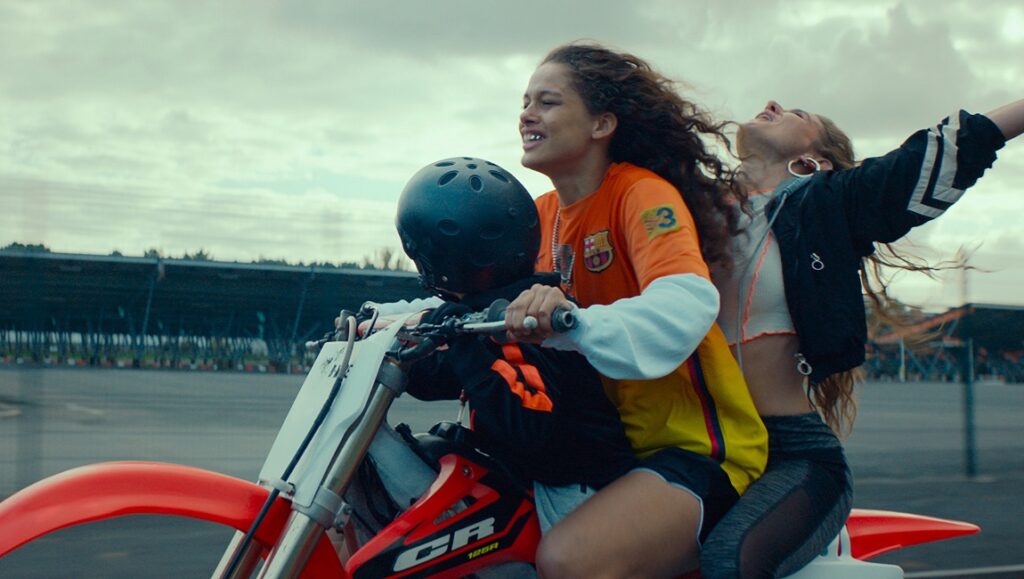Outside the confines of polite Parisian society, there lies a wild west on wheels, in a subculture known as the urban rodeo. Though participation is criminalized and heavily criticized, the exhilarating, and dangerous, motorbike subculture at the center of Rodeo acts as a catalyst for community. This is director Lola Quivoron’s narrative feature debut, but it isn’t her first time behind the camera — she released Au loin, Baltimore, a short documentary set within the same scene, in 2016. Rodeo follows Julia (played by first-time actor Julie Ledru, who Quivoron discovered via Instagram bike clips), a lone wolf dirt bike rider on the fringes of a larger crew on the circuit called the B-Mores, who run a bike shop repairing and selling stolen bikes. Though she hasn’t mastered the risky stunts the group is known for, she shares their bravado, and better yet, a penchant for risk, stealing bikes for them later on. The crew is ruled from afar by Domino (Sébastien Schroeder), currently behind bars, but it’s Kais (Yanis Lafki) who invites Julia into the fold. In another film, this would be a setup for a romance over their shared interests, but Rodeo’s script is far more interested in thornier dynamics.
Choosing high-octane impulses over the more popular naturalism of late, Rodeo is a gasoline western where the outlaw hasn’t yet mastered the reins. Julia remains feral, untested when it comes to the wheelie-popping showmanship of the crew, instead gaining respect via theft. Her Robin Hood stunt relies on expectations of her youth and gender. She approaches wealthy men in the French countryside posing as a new rider buying a bike, and rides off into the horizon when she is offered a test drive by the seller who’s none the wiser. Her routine is helped by the time she spends with Domino’s wife Ophélie (co-writer Antonia Buresi), who disguises Julia in a more feminine persona, an act that appears akin to drag. Ophélie is a foil to Julia’s freewheeling life, trapped in a determinist narrative of her own life, a housewife with a young son in the suburbs sitting and watching a different life that excites her. The dynamic between the two, and a more lighthearted scene where Ophélie rides on the back of Julia’s bike, is the heart of a film that would otherwise be shallow in its grit. Though it is clear in these scenes that Ledru’s straight-from-life acting is somewhat amateur, Buresi plays the role with a haunting subtlety that humanizes both characters.
The film’s nomination for Cannes’ Queer Palm award came as a surprise to some, as its queerness was less textually overt than, say, WIll-o’-the-Wisp in the same year. But despite this, the thematic throughline of Rodeo deconstructs a binary of gendered actions, and the relationship between Julie and Ophélie, though intentionally ambiguous, grounds an emotional arc for our unbound protagonist. Julia’s gendered dynamic within the rest of the bike group is never simplified as a lone otherness in the testosterone-fuelled culture. Rather, a bonfire sequence shows her moving seamlessly among the crew, and an assortment of women, mostly partners, who have come with them. She neither belongs to nor is outwardly excluded from either group — an in-between that parallels the purgatory between life and death that some of the film’s most dangerous and abstract sequences inhabit. Her nickname within the group is “Unknown”; speaking to an alienation in a group that doesn’t quite accept her, but also a desire to not be recognized solely for her gender.
The shaky-cam-heavy cinematography and cast of mostly non-professional actors lends an impression that this is the veristic sort of contemporary coming-of-age film that treats diegetics as a sole virtue. Instead, the result is more akin to Titane than the Dardennes, seamlessly constructing a transhumanist bond with the fantasy of the machine world. Julia says she was “born with a bike between her legs,” an assertion of her own desire to avoid gendered interactions (more subtle than the tiresome balls jokes that bring an otherwise serviceable script down). Her freedom when connecting with the machine will be her downfall, as it will be for the rest of the crew, but this conflagration is rendered poetic in the film’s coda. The out-of-body experience, as Julia and Kais have to accept the danger of the life they’ve chosen, one last heist, lifts them from reality, and for once the camera sits still long enough for the flames to subside and the ghosts to turn the corner.
Published as part of InRO Weekly — Volume 1, Issue 11.


Comments are closed.